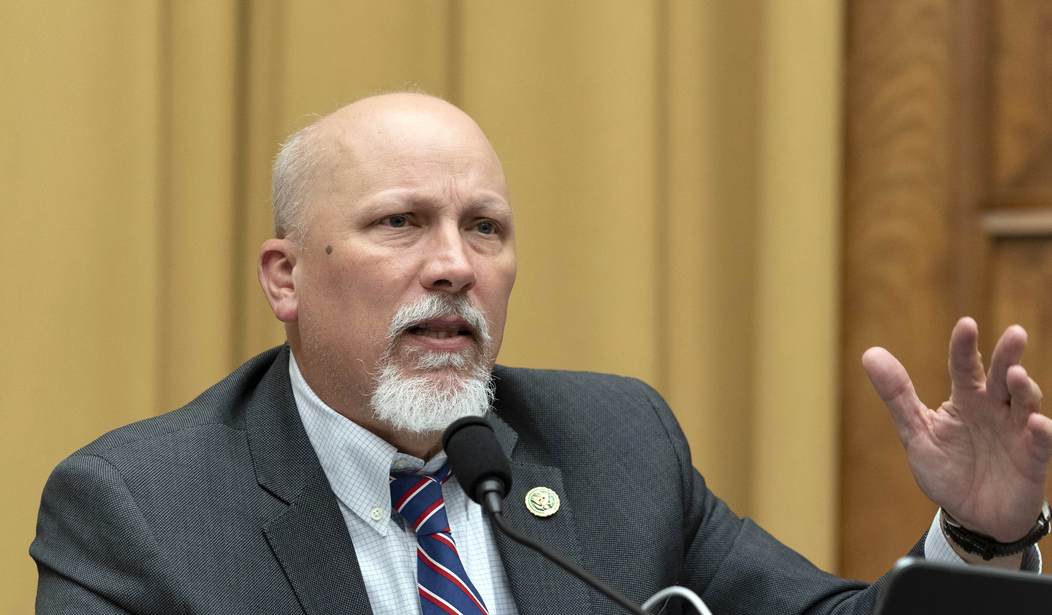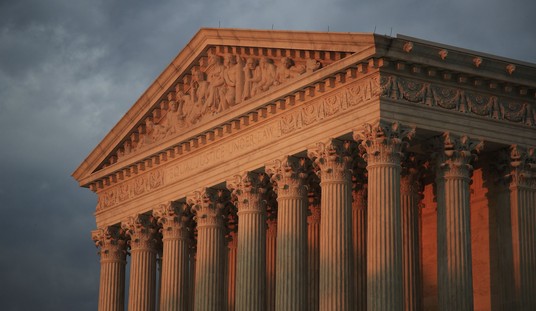Rep. Chip Roy (R-TX) certainly felt a sense of validation and victory on Tuesday when U.S. District Judge James Hendrix ruled that the Consolidated Appropriations Act of 2023 violated the Quorum Clause included in Article 1 Section 5 of the Constitution. The act was sent to President Joe Biden on December 28, 2022, and he signed it the next day. The state of Texas had brought the case against Attorney General Merrick Garland and others, with the trial taking place in January of this year. According to a press release from Roy's office, this was "the first time in American history that a chamber of Congress passed a bill without a physical majority present."
Pointing to the conclusion of Judge Hendrix's order, Roy's press account on X highlighted how "In sum, the Court concludes that this case is justiciable and that the House of Representatives' passage of the Consolidated Appropriations Act of 2023 violated the Quorum Clause."
BREAKING:
— Rep. Chip Roy Press Office (@RepChipRoy) February 27, 2024
Federal judge in TX rules the FY23 omnibus violated the Constitution's Quorum Clause because a physical quorum was not present due to mass proxy voting in the House
Rep Roy repeatedly called this out on the House floor & was proud to file an amicus brief in this case pic.twitter.com/FGapguZK73
Roy himself is mentioned in the ruling several times, including how he raised the issue whether there was a quorum at the time the act passed, though "the Speaker Pro Tempore informed him that there was no recourse." He was repeatedly told this as he continued to ask about a quorum. This included when Roy made a parliamentary inquiry asking "whether there is a physical quorum present as required under the Constitution and whether there is any recourse for any Member under [the House’s] rules to challenge a ruling that there is a quorum."
The Speaker Pro Tempore argued hat a quorum was present, because "Members casting their vote or recording their presence by proxy are counted for the purpose of establishing a quorum," even when Roy asked that those members physically present be counted.
Recommended
Judge Hendrix noted in his order that "less than a majority of the House voted in person."
The order also later addressed Roy's inquiry once more towards the end, with added emphasis:
...The response to Representative Roy's inquiry about whether a quorum was physically present was not that the quorum was presumed or physically present, but that the absent members voting by proxy counted towards the quorum... This exchange further exemplifies the unique nature of this rule. Had the House attempted to pass the Act by unanimous consent in the absence of a physical quorum, a member ordinarily could have objected to the lack of a quorum and required a majority to appear. But with this rule, even if the physical absence of a majority were shown, the House still deemed itself to have a quorum, and no member could prevent legislative action based on that absence.
...
...And when Representative Roy inquired into whether a physical quorum was present, the response was that the House counted those absent members participating by proxy as part of the quorum... Treating absent members as present via proxy in order to create a non-present majority violates the Quorum Clause. Yet that is what the House did through its proxy rule when passing the Act. The House lacked the constitutionally required quorum but sought to evade the Constitution's limits by counting absent members as present in order to conduct business. The Quorum Clause prohibits Congress from doing so. Accordingly, Texas has carried its burden of proof that the House violated the Quorum Clause when it passed the Act.
As highlighted in that press release from Roy's office last April, the congressman and other members filed an amicus brief in support of Texas. "The brief supports the State of Texas’ position that the passage of the $1.7 trillion omnibus spending bill for FY 2023 violated the Constitution’s physical quorum requirement and should be overturned," the press release revealed.
The press release also highlighted key excerpts from the brief:
The brief contends,“Article I [of the Constitution] unmistakably requires that House and Senate members be physically present when conducting certain legislative business.”
“The United States has endured for nearly 250 years because of our commitments to the Constitution and to representative government. The COVID-19 pandemic is no excuse to abandon these commitments.”
Signers of the amicus brief also include Representatives H. Morgan Griffith (VA-9), Andy Ogles (TN-5), Harriet Hageman (WY-AL), Andy Biggs (AZ-5), Clay Higgins (LA-3), Warren Davidson (OH-8), Gary Palmer (AL-6), Matt Rosendale (MT-2), and John Rose (TN-6).
“Our government is one of checks and balances. For our constitutional structure to work, however, it must be followed,” the brief adds. “…the Consolidated Appropriations Act of 2023 cannot be sustained as proper exercise of Congress’s power to enact legislation.”
...
- “Americans are blessed to live under a written Constitution. And there is no dispute that the Constitution places limits not solely on what legislation may be enacted, but the manner in which it is enacted.”
- “Consistent with the principles surrounding representative government, the Constitution does not permit the House of Representatives to adopt an exception to the rule that one must vote in person. In short, to do business, Congress must have a quorum physically present in the House.”
- “The House of Representatives’ adoption of proxy voting rules was unconstitutional on the day that it was announced; this Court therefore has the power—indeed the duty—to review and adjudicate the constitutionality of legislation enacted due only to proxy voting.”
- “The Constitution was made for times such as this, when government may claim emergency powers or special privileges to respond to extraordinary circumstances. But affording the government such powers undermines our structure of government, and ultimately imperils American citizens even more than infectious disease does.”
- “This Court may correct a constitutional error, and restore the primacy of the Constitution, by preliminarily enjoining the Consolidated Appropriations Act of 2023.”
Roy isn't the only one celebrating the decision. Texas Attorney General Ken Paxton played a key role as well, along with the Texas Public Policy Foundation (TPPF). All have highlighted the $1.7 trillion price tag.
The congressman tagged and thanked both in a post from his political account that was a quoted repost from Paxton. In his post, Paxton raised a key issue, which is that the proxy vote came in 2020 as a response to the COVID-19 pandemic, and was abused from there.
"Former Speaker Nancy Pelosi abused proxy voting under the pretext of COVID-19 to pass this law, then Biden signed it, knowing they violated the Constitution. This was a stunning violation of the rule of law. I am relieved the Court upheld the Constitution," Paxton's post read in part.
Thank you to @TXAG Ken Paxton and @TPPF for leading this effort. It’s reach will not be immediate, but hugely important precedent against unconstitutional proxy voting. https://t.co/iMoIsvvkHJ
— Chip Roy (@chiproytx) February 27, 2024
A post from the TPPF noted in part that "As less than half of the members were present when the legislation was passed, with the rest voting by proxy, this legislation never should have passed, and the president should not have signed it."
Read more about our historic lawsuit on behalf of the State of Texas: https://t.co/Ef7L0F1emA pic.twitter.com/OyrxyAMYGJ
— Texas Public Policy Foundation (@TPPF) February 27, 2024
When it comes to the burning questions as to what's next, Roy also shared a helpful post as to we can expect following the order.
Given that this is for Fiscal Year 2023 we're talking about here, the money has been spent. The congressman also notes it will be litigated further. Perhaps the largest takeaway, then, and the most optimistic of looking at it, is how "this is mostly for precedent. Roy also pointed out "proxy voting bad," and Hendrix's order highlighted the unconstitutionality of proxy voting at length.
Lots of questions about what’s next. 1) It will be litigated further & up the chain. 2) it only enjoins a small part of it that was the basis for standing. 3) the money has fully/largely been spent (FY23), so this is mostly for precedent (proxy voting bad). https://t.co/uUtBXmTegy
— Chip Roy (@chiproytx) February 27, 2024

























Join the conversation as a VIP Member